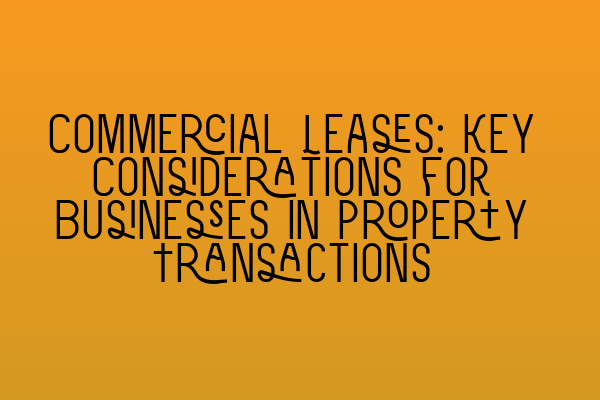Commercial Leases: Key Considerations for Businesses in Property Transactions
If you’re a business owner looking to rent or lease a property for your operations, understanding the complexities of commercial leases is crucial. Commercial leases outline the terms and conditions that govern the relationship between the landlord and tenant. These agreements involve significant financial and legal obligations, so it’s essential to be well-informed before entering into any property transaction.
In this blog post, we will discuss some of the key considerations for businesses when dealing with commercial leases. From understanding the different types of commercial leases to negotiating favorable terms, we’ll provide you with valuable insights to help you make informed decisions.
Types of Commercial Leases
Before diving into the intricacies of commercial leases, it’s important to be aware of the different types available. Commercial leases can be categorized into three main types:
1. Full Repairing and Insuring (FRI) Lease: In an FRI lease, the tenant is responsible for all repairs and maintenance of the property, as well as costs associated with insurance. This type of lease places a higher burden on the tenant but provides greater control over the property.
2. Internal Repairing (IR) Lease: An IR lease involves the tenant taking responsibility for repairs and maintenance of the internal parts of the property. The landlord typically handles external repairs and covers insurance costs. This arrangement can be advantageous for businesses that don’t require complete control over the property.
3. Gross Lease: A gross lease is an all-inclusive lease where the tenant pays a fixed monthly rent, and the landlord covers all property-related expenses, including insurance and maintenance costs. This type of lease can simplify financial obligations for businesses but may come with a higher rental cost.
It’s crucial to analyze your business needs and priorities to determine the most suitable lease type for your operations. Seeking professional advice from a property lawyer can help in making an informed decision.
Negotiating Terms
Commercial leases are inherently negotiable, and businesses have the opportunity to negotiate terms that align with their needs. The following are some essential terms to consider during lease negotiations:
1. Rent and Rent Reviews: Understand the rent structure and frequency of rent reviews. Ensure you have clarity on how rent increases will be calculated and when they will occur.
2. Lease Term and Break Clauses: The length of the lease term and the availability of break clauses are vital considerations. Break clauses allow tenants to terminate the lease before the end of the term, providing flexibility in case of unforeseen circumstances.
3. Repair Obligations: Carefully review the repair obligations outlined in the lease. Determine whether the costs of repairs fall solely on the tenant or are shared with the landlord.
4. Alienation: Alienation refers to the ability to transfer or assign the lease to another party. Assess whether your business needs flexibility in assigning the lease, should you decide to relocate or sell the business.
5. Use and Alterations: Ensure that the permitted use specified in the lease aligns with your business activities. Additionally, understand any restrictions or requirements related to alterations or improvements to the property.
Professional Legal Advice
Navigating the intricacies of commercial leases can be overwhelming, especially for businesses without legal expertise. Seeking professional legal advice from property lawyers specializing in commercial leases is highly recommended. They can provide valuable insights, negotiate terms on your behalf, and ensure your interests are protected throughout the transaction.
At SQE Property Law & Land Law, we have a team of experienced property lawyers who can assist you with all aspects of commercial leases. Our expertise in property law, coupled with our commitment to client satisfaction, makes us the ideal partner for your property transaction needs.
Conclusion
Entering into a commercial lease is a significant step for any business, with long-term implications. Understanding the types of leases available, negotiating favorable terms, and seeking professional legal advice are all crucial elements when dealing with commercial leases.
If you’re looking for expert legal assistance in commercial leases or other property transactions, SQE Property Law & Land Law is here to help. Contact us to discuss your needs and let our experienced team guide you through the intricate world of commercial leases.
Related Articles:
– SQE 1 Practice Exam Questions
– SQE 1 Practice Mocks FLK1 FLK2
– SQE 2 Preparation Courses
– SQE 1 Preparation Courses
– SRA SQE Exam Dates
